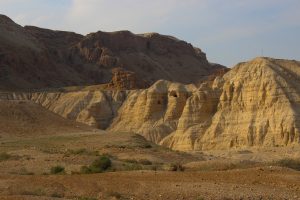The Great Revolt
With the memory of the successful revolt against the Greeks that had begun in 167 BCE the movement grew, but the ‘the nation was infected with this doctrine to an incredible degree’ that the cause of the revolt against Rome was set in motion through this doctrine and exploded 60 years later in 66 CE as the nation could no longer suffer the great evil and oppression of Gessius Florus the Roman governor at the time.’1
Florus’ behavior was the final act that ignited the conflict that began the Great Revolt. The Jewish resistance became divided and the inner war between rival factions cost many lives insuring their eventual defeat. 2 The faith that united the Jews against the Greeks failed to unite the Jewish nation and the divisive unstable character that began with the Sicarii prevailed. The Talmud refers to the inner struggle as senseless hatred (sinat chinam שנאת חינם) as the cause of the war that led to the destruction of Jerusalem and the Temple.
But why was the second Sanctuary destroyed, seeing that in its time they were occupying themselves with Torah, [observance of] precepts, and the practice of charity? Because therein prevailed hatred without cause. That teaches you that groundless hatred שנאת חינם is considered as of even gravity with the three sins of idolatry, immorality, and bloodshed together. And [during the time of] the first Sanctuary did no groundless hatred prevail? Surely it is written: They are thrust down to the sword with my people; smite therefore upon my thigh,13 and R. Eleazar said: This refers to people who eat and drink together and then thrust each other through with the daggers of their tongue!
Talmud – Mas. Yoma 9b
According to Josephus more than 1,100,000 lost their lives in the siege of Jerusalem and 97,000 were taken captive during the duration of the war. 3 As the Lord had promised, for seeking Him and turning from wicked ways, He would forgive and heal the land but if the nation turned from obedience, the people would be cast out of the land and the Temple destroyed. 4
Discerning Prophetic Timing
Beside the heavy taxation, oppression and suffering imposed on the Judeans by the Roman governor Florus, what drove the Jews to war and gave them hope to defeat the might of Rome, was interpretation of the prophetic writings concerning their national destiny, primarily from the instigation of the Sicarii.
Josephus writes of God’s warnings at the time that were not heeded and messianic fervor that had swept the nation into a futile war:’
“Now, if anyone consider these things, he will find that God takes care of mankind, and by all ways possible predicts to our race what is for their preservation; but that men perish by those miseries which they madly and voluntarily bring upon themselves; for the Jews, by demolishing the tower of Antonia, had made their temple square, while at the same time they had it written in their sacred oracles, “That then should their city be taken, as well as their holy house, when once their temple should become square.” But now, what did the most elevate them in undertaking this war, was an ambiguous oracle that was also found in their sacred writings, how, “about that time, one from their country should become governor of the habitable earth.” The Jews took this prediction to belong to themselves in particular; and many of the wise men were thereby deceived in their determination. Now, this oracle certainly denoted the government of Vespasian, who was appointed emperor in Judea. However, it is not possible for men to avoid fate, although they see it beforehand. But these men interpreted some of these signals according to their own pleasure; and some of them they utterly despised, until their madness was demonstrated, both by the taking of their city and their own destruction.”
Jewish Wars, Book VI, Chapter 5.4 (310-315)
As Josephus and others praised the Essenes for their piety, he also credits them for their ability to discern the prophetic. The Essenes, as the men of Issachar in David’s time, ‘had understanding of the times, to know what Israel ought to do,’ 5 He credits them for their strict adherence to the tenets of scripture and accuracy concerning prophetic events and timing. He writes that by their dedication to reading the scriptures ‘and being perpetually conversant in the discourses of the prophets; and it is but seldom that they miss in their predictions.’ 6 He cites their accuracy to ‘affrim, that fate governs all things, and that nothing befalls men but what is according to its determination.’ 7
Josephus had intimate knowledge of the Essene’s, their doctrinal views and beliefs having studied with them at an early age. He writes of his journey to learn of the beliefs of his day:
(10) and when I was about sixteen years old, I had a mind to make trim of the several sects that were among us. These sects are three:—The first is that of the Pharisees, the second that Sadducees, and the third that of the Essenes, as we have frequently told you; for I thought that by this means I might, choose the best, if I were once acquainted with them all; (11) so I contented myself with hard fare, and underwent great difficulties and went through them all.
The Life of Flavius Josephus, Book 1.2 (9-12)
Although he chose to follow the rules of the Pharisees, he spoke more highly of the community, beliefs and character of the Essenes to much greater length than the Pharisees or Sadducees. 8
It’s not known for sure but it’s possible that the Essenes withdrew from the war with Rome based on their understanding of the prophecies concerning the nation. Yet Josephus records that they suffered at the hands of the Romans which would indicate their involvement and that at least one Essene, John, was a general in command of rebel forces 9 suggesting division within.
However, the nation would follow the Pharisee interpretation of the prophecies, particularly the Sicarii interpretation concerning its elevation to world prominence under messianic leadership, the foretold time for Israel to be scattered was at hand. Isaiah’s prophetic warnings 10 were about to become a reality for Judea and as the record testifies, and the understanding of the Essenes presented a voice calling in the wilderness to the nation.
From an Essene document entitled ‘The Exhortation’ their foundation for understanding the future coming destruction of the nation is rightly discerning the prophetic message of the law.
(4Q397 14-21 I followed by 4Q398)
[And you know that] we have separated from the mass of the peo[ple] .. (8) and from mingling with them in these matters and from being in contact with them in these (matters). And you k[now that no] treachery or lie or evil (9) is found in our hands for we give for [these] th[e …And furthermore] (10) we [have written] to you (sing.) that you should understand {the Book of Moses} (4Q398 14-17 i) and the Book[s of the Pr]ophets and Davi[d and all (11) the events] of every age. And in {the Book is written} (40398 14-17 i) … not [for] (12) you {and the days of old} (40398 14-17 i).
And furthermore it is written that [you will depart] from the w[a]y and that evil will befall you (cf. Deut. xxxi, 29). {And it is written} (40398 14-17 i),
1. Antiquities of the Jews Book XVIII Chapter 1.6 (23-25); Book XX Chapter 11.1 (252-258)
2. Jewish Wars Book V Chapter 1.4-5
3. Jewish Wars Book IV Chapter 9.3 (420-421)
4. 2 Chronicles 7:14, 19-21
5. 1 Chronicles 12:32
6. Jewish War Book IV Chapter 8.12 (159)
7. Antiquities of the Jews, Book XIV Chapter 5.9 (172)
8. Jewish War, Book II, Chapter 8.1-14 (117-166)
9. Jewish War, Book II, Chapter 20.4 (566-568);
10. Isaiah 6:11-13



